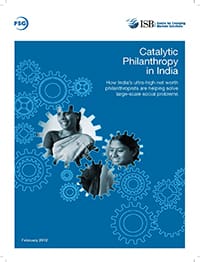By studying the impact of India’s leading philanthropists, effective practices in social change emerge and can be replicated. The burgeoning philanthropy market can start to enact real change in the country.
Top Takeaways
- Most philanthropy in India is in its infancy and follows a “give back” rather than a “solve social problems” approach.
- To effect lasting social change, Indian philanthropists can begin to shift to a catalytic philanthropy model.
- Catalytic philanthropists in India follow four practices: they focus and use data to drive systemic change, collaborate across sectors, use multiple tools, and measure and learn continuously.

